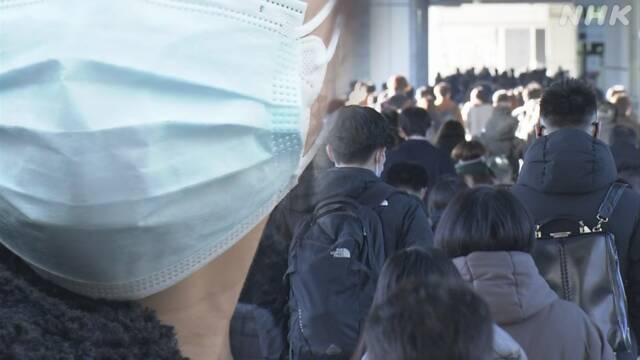In 15 days, it will be three years since the first infection with the new coronavirus was confirmed in Japan.
NHK conducted a public opinion survey on anxiety about the new corona, infection control, and impact on life.
Although 84% of people still say they are "anxious" about the spread of infection, it has decreased by about 10% from the survey conducted three years ago, and it was found that the degree of anxiety, especially among the younger generation, has decreased. .
From November 1st to December 6th last year, NHK conducted a poll of 3,600 people over the age of 18 nationwide by mail, and received responses from 2,266 people, or 62.9%.
According to the survey results, 84% of people answered that they were worried about the spread of the new corona infection, including "very worried" and "somewhat worried", while "not very worried" answered "not at all." 16% answered "I'm not worried".
The number of people who answered that they were "anxious" was gradually decreasing from 93% in November three years ago to 89% in November two years ago.
By age group, 75% of those in their 18s and 20s answered that they were "anxious," down 13 points from three years ago, 71% of those in their 30s, down 18 points, and 79% of those in their 40s. A decrease of 11 points, 83% of those in their 50s had a decrease of 11 points.
On the other hand, 91% of those in their 60s decreased by 5 points, and 91% of those in their 70s or older also decreased by 4 points. It was found that the rate of decrease was small, and the difference in reception by generation was widening year by year.
In addition, when asked about the infection control measures they are practicing with multiple answers, 98% answered "masks and hand washing", which is not much different from 99% three years ago, but many people still do it. Avoidance of crowds and close contact” decreased by 9 points from 3 years ago to 69%, and “social distance to keep a distance from people” also decreased by 9 points to 61%.
Evaluation of the government's response and future measures
When asked how much they evaluated the government's response to the new corona, 55% of them "highly evaluated" and "somewhat evaluated", and "not very evaluated" and "not evaluated at all". 44%.
"Evaluate" decreased by 4 points from the previous survey, while "Do not evaluate" increased by 5 points.
When asked to select from options what they would like the government to put the most effort into in the future as a countermeasure against corona, 49% answered "development of therapeutic drugs and vaccines", followed by "financial support" at 20%, and " 15% answered “expansion of treatment system” and 5% answered “expansion of examination system”.
Compared to the previous survey, "financial support" increased by 6 points, while "expansion of inspection system" decreased by 4 points.
When asked which of "infection control" or "recovery of economic activity" should be emphasized, 39% of respondents answered "infection control" and "rather than infection control", and "rather than economic activity". ” and “Economic activity” together accounted for 60%.
By age group, “economic activity” greatly exceeded “infection control” for both men and women up to their 60s, and the younger generation in particular tended to emphasize the recovery of economic activity.
Pros and cons of "legal treatment" of the new corona
When asked about the pros and cons of lowering the legal treatment of the new corona to the same position as seasonal influenza, 59% of respondents said they "agree" and "somewhat agree", and "somewhat disagree." A total of 40% were against.
By gender and age, more than 70% of men aged 18 to 50 and women in their 30s agreed.
When asked about their reasons for agreeing, 30% said, "Even if infected, it is less likely to become severe," and 29% said, "Because it reduces the burden on medical institutions and makes it easier to receive treatment when needed." 22%, and 22% said that they would be in trouble if they did not turn the economy around.
On the other hand, 34% of the respondents said that they were opposed to it because "relaxing regulations makes it easier to get infected", 32% said "the rate of severe cases and fatalities is likely to be higher than that of seasonal influenza", and "public funding". 20% said that they may not be able to receive treatment or vaccines due to
Expert "Awareness of basic infection control, it is important to turn society and economy"
Professor Kazuhiro Tateda of Toho University, a member of the government's subcommittee on measures against the new coronavirus, said, ``At first, many people were worried about the unknown virus, but three years after the spread of the infection, the characteristics and fears of the virus were revealed. Well, it seems that the number of people who are anxious has decreased as each person has come to understand the measures, and in a sense, it shows that we have become able to deal with this infectious disease. However, there is no change in the fact that if we are a little careless, the medical field will be overwhelmed and lead to a rapid increase in the number of infected people. It's important to keep the economy going," he said.

